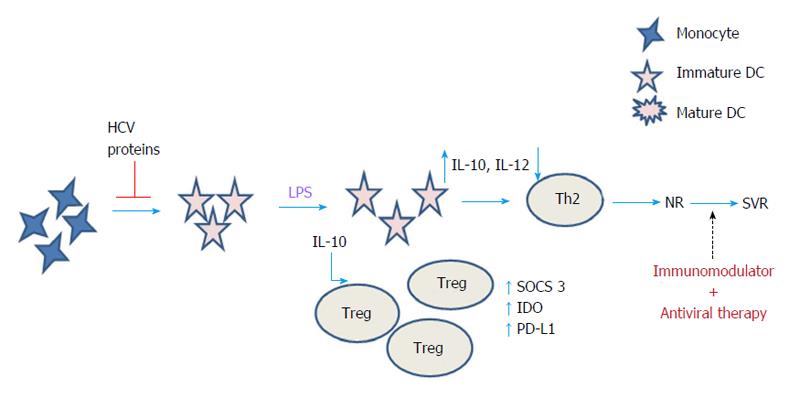Copyright
©The Author(s) 2015.
World J Hepatol. Sep 8, 2015; 7(19): 2202-2208
Published online Sep 8, 2015. doi: 10.4254/wjh.v7.i19.2202
Published online Sep 8, 2015. doi: 10.4254/wjh.v7.i19.2202
Figure 1 Proposed mechanism of dendritic cell impairment during chronic hepatitis infection and its relationship with antiviral therapy.
Exposure of mo-DCs to HCV proteins ex vivo upregulated the expression of SOCS 3, IDO and PD-L1 that may be responsible for the observed maturation and activation defects in DCs including decreased secretion of IL-12 and IFNγ on LPS stimulation leading to the differentiation of Th2 cells. Such DCs also produced increased levels of IL-10 that promote the differentiation of regulatory T cells. Antiviral therapy along with some immunomodulation targeting these inhibitory molecules would help in the reconstitution of DC function in the antiviral therapy non-responders and would help to achieve SVR. SVR: Sustained virological response; NR: Non-responders to therapy; IL: Interleukin; IFN: Interferon; Th: T helper; SOCS: Suppressor of cytokine signalling; IDO: Indoleamine 2,3-dioxygenase; PD-L1: Programmed death ligand 1; LPS: Lipopolysaccharide; CHC: Chronic hepatitis C; DC: Dendritic cells; HCV: Hepatitis C virus; mo-DC: Monocyte-derived DCs; Treg: Regulatory T cells.
- Citation: Sachdeva M, Chawla YK, Arora SK. Dendritic cells: The warriors upfront-turned defunct in chronic hepatitis C infection. World J Hepatol 2015; 7(19): 2202-2208
- URL: https://www.wjgnet.com/1948-5182/full/v7/i19/2202.htm
- DOI: https://dx.doi.org/10.4254/wjh.v7.i19.2202









